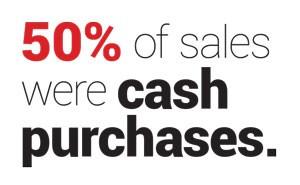In early 2015, an investment banker and his wife were eyeing a two-bedroom condominium listed at $2 million on the Upper East Side. The couple was wealthy, according to their friend and broker Mike Loftus of William Raveis, but not wealthy enough to buy the unit outright.
They had $500,000 in cash and “a pretty big portfolio, but not that big compared to other wealthy buyers,” Loftus said of their financial investments, which he pegged at between $5 million and $7 million.
They needed to borrow the balance for the apartment — $1.5 million — but didn’t want to go through the hassle of a mortgage.
They also wanted the buyer’s advantage of having cash in hand.
 “An all-cash offer rings stronger than any kind of contingent offer,” said Larry Link, the president and principal broker of Level Group.
“An all-cash offer rings stronger than any kind of contingent offer,” said Larry Link, the president and principal broker of Level Group.
In cases like this, brokers usually ask their clients to work with their financial advisers to find other assets to borrow against, most often another home but increasingly their investments in stocks and bonds.
The couple did just that and ended up with a “non-purpose loan,” or a loan backed by their own financial portfolio, enabling them to make an all-cash offer and seal the deal.
Also known as securities-based borrowing, this financial tool is playing a quiet but powerful role in driving “all-cash” deals in Manhattan’s luxury residential market, which these days accounts for over 50 percent of sales.
The practice — essentially a margin loan that the borrower can spend on anything except more securities — is becoming more prevalent, according to Manhattan-based real estate brokers, lawyers and wealth advisors. Loftus, who spent three decades in the finance industry before going into real estate in 2013, said it’s especially common in New York.
The benefits of going this route include near-instantaneous availability of millions of dollars, flexibility on repayment and low costs.
Non-purpose lending also enables wealthy Americans to compete in the real estate market with high-net-worth foreign buyers, who often come to the table with physical stacks of cash.
Loftus said his clients knew they could get cash “the next day,” which allowed them to close in 30 days rather than the 60 or 90 days typical with a mortgage.
Some banks have promoted this type of securities-based lending as a quicker alternative to traditional home-equity loans. “If you need money in a hurry … it may only take a few days to get the loan approved,” Citi’s Personal Wealth Management division stated in marketing materials posted online earlier this year. “It can take at least a few weeks, and sometimes much longer, to set up a home-equity loan or line of credit.”
 Sellers are none the wiser about what type of loan is used. Nor do they care, according to Edward Mermelstein of real estate law firm RheemBell & Mermelstein.
Sellers are none the wiser about what type of loan is used. Nor do they care, according to Edward Mermelstein of real estate law firm RheemBell & Mermelstein.
But the practice is not for the risk averse, particularly those who prefer the fixed-interest rates and predictable payments of a mortgage. Non-purpose loans are typically used as a form of bridge financing because they expose the borrower to margin calls if the value of the portfolio used as collateral shrinks. So many of the buyers who use non-purpose loans for their initial purchase quickly line up mortgages after their deal is complete.
For example, Loftus said his clients, the investment banker and his wife, were in the process of “backing into a mortgage” on their Upper East Side condo.
Financial institutions determine based on a long list of rules how much a client can borrow and against which stocks and bonds. In general, a higher percentage of the holdings can be borrowed against U.S. government bonds than against stocks because stocks are more volatile.
Wells Fargo Advisors offers wealthy clients loans of at least $1 million and “generally $5 million and up” that equal 50 to 95 percent of the value of their investments, depending on what assets they hold, according to its website.
Stocks that trade below $10 a share are not eligible as collateral, said Shaun Van Vliet, a senior financial advisor at a Merrill Lynch subsidiary called Consilium Associates. Lower-priced stocks tend to be more volatile, meaning they can lose value quickly and dramatically. “The bank wants to protect you from yourself,” said Van Vliet, who advises high-net-worth families, executives and entrepreneurs.